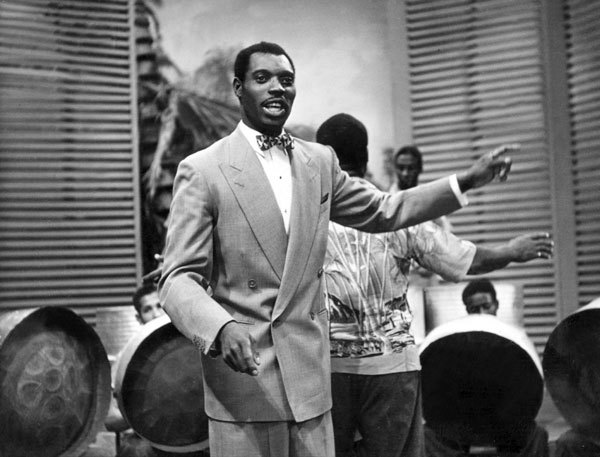
"Is a kind of place where hate and disgust and avarice and malice and sympathy and sorrow and pity all mix up. Is a place where everyone is your enemy and your friend.”
So says Sam Selvon of London in The Lonely Londoners, one of the first novels to relate the story of the Windrush generation — the thousands of Caribbean people who came to live in the UK following the British Nationality Act of 1948.
If Selvon summed up their experiences with his prose, one group of musicians did the same with their songs.
The Windrush calypsonians — the likes of Lord Kitchener, the Mighty Terror and Lord Beginner — sang of the joys and the despairs of living in the capital from the 1940s onwards. Although most of their songs are jaunty and sunny-sounding, there's often an underlying darkness.
Here are their greatest London hits.
The good times
Not just the quintessential Windrush song, Lord Kitchener's London is the Place for Me is perhaps the ultimate ode to the city. Of course, he wrote is before he'd stepped foot on British soil, and possibly regretted the lyric: "To live in London you are really comfortable / Because the English people are very much sociable."
Kitch hadn't yet experienced the widespread racism that riddled London and the rest of the country. As Sam King, one of the early Windrush immigrants explains, rumours started spreading that even parliament wasn't happy: "We heard people on the radio saying, 'why are they coming'?" he recalls.
If one song catches the affection felt among some people from the colonies for the British Monarchy it's Young Tiger's I Was There (At the Coronation). There's a carnival atmosphere to a song that is unabashedly patriotic.
Though many Caribbeans were eager to integrate, they also stuck together in this strange, cold land. “There was a greater feeling of togetherness among that generation of us than I have seen in any other group,” writes Baron Baker in Forty Winters On (1988).
"Cricket, lovely cricket." Lord Beginner's chirpy ode is all about the West Indies' 1950 victory over England at Lord's.
The Cricket Song by Kitch is in the same joyous vein. And here's a lovely little excerpt from the Yorkshire Post and Leeds Intelligencer in 1950, about Kitch attending a match, and writing an ad hoc song:


Images © Johnston Press plc. Image created courtesy of the British Library Board.
The Mighty Terror's Women Police in Great Britain isn't the most politically correct song you'll hear. But there is some kind of skewed respect for the Met's female officers. You've also got to admiring him for crowbarring in 'fet'. We don't know what it means but we can jolly well presume.
This song does bring up a serious point; one which is notable in all of the songs chosen here: the narrative of the Windrush Generation was overwhelmingly male. That's not to say there weren't plenty of Windrush women who had something to say. Beryl Gilroy was a writer and the first black headteacher in London. Gilroy herself claimed her novel In Praise of Love and Children — about a black teacher trying to settle in a racist Britain — was written in 1959 but 'lost' until 1994 [PDF].
Some great female calypsonians came along later including Phyllis Dillon and Nora Dean.
The bad times
Rationing was in full effect in the 1940s and 50s — something which the likes of Lord Lebby struggled with. In this tune he dreams of ackee and saltfish long before the days when it was readily available in London. In the Lonely Londoners the incorrigible character Sir Galahad resorts to catching a pigeon because he's so hungry.
The sun was something else many pined for, including Claude Ramsey, who writes in The Windrush Legacy (1988): “ I remember during winter being surprised at actually seeing my own breath coming out of my mouth.”
It might feature a chirpy sax hook but Lord Kitchener's My Landlady is a highly-irritated account of the many Brits who were chary of their exotic new neighbours. You can almost picture the net curtains and smell the rising damp. Says May Cambridge in Forty Winters On: “People had to share rooms and even the cellars were used. One of my landladies charge 1d for toilet tissue.”
But it wasn't just landladies who treated immigrants with disdain. Many police officers did too, one claiming "The undesirables are here and established and short of deporting large numbers this is little answer."
"Never me again will go by London Underground train," snarls Kitchener in this ditty that sees him decide the best way not to get lost is to follow a pretty lady. He falls down the escalator. He doesn't learn. He starts following more pretty ladies.
Interesting one this: the Mighty Terror's lament about how London lacks a carnival scene would only be relevant for five years: in 1959 a 'Caribbean Carnival' was held at St Pancras Town Hall, planting the seeds for the Notting Hill Carnival.
The St Pancras festival may have been a sweet and colourful thing, but it blossomed from a dark and bitter seed; the 1958 murder of 22-year-old Kelso Cochrane.
An awesome song about the British general election doesn't come along every, er, general election. But Lord Beginner pulled it off in 1950's General Election, which documents him standing in the cold and rain with his girlfriend in Piccadilly Circus, being utterly confused by what was going on. Britain finally elected its first black MPs 37 years after the song was recorded.
To learn more about the Windrush generation, visit the Black Cultural Archives in Windrush Square, Brixton.



